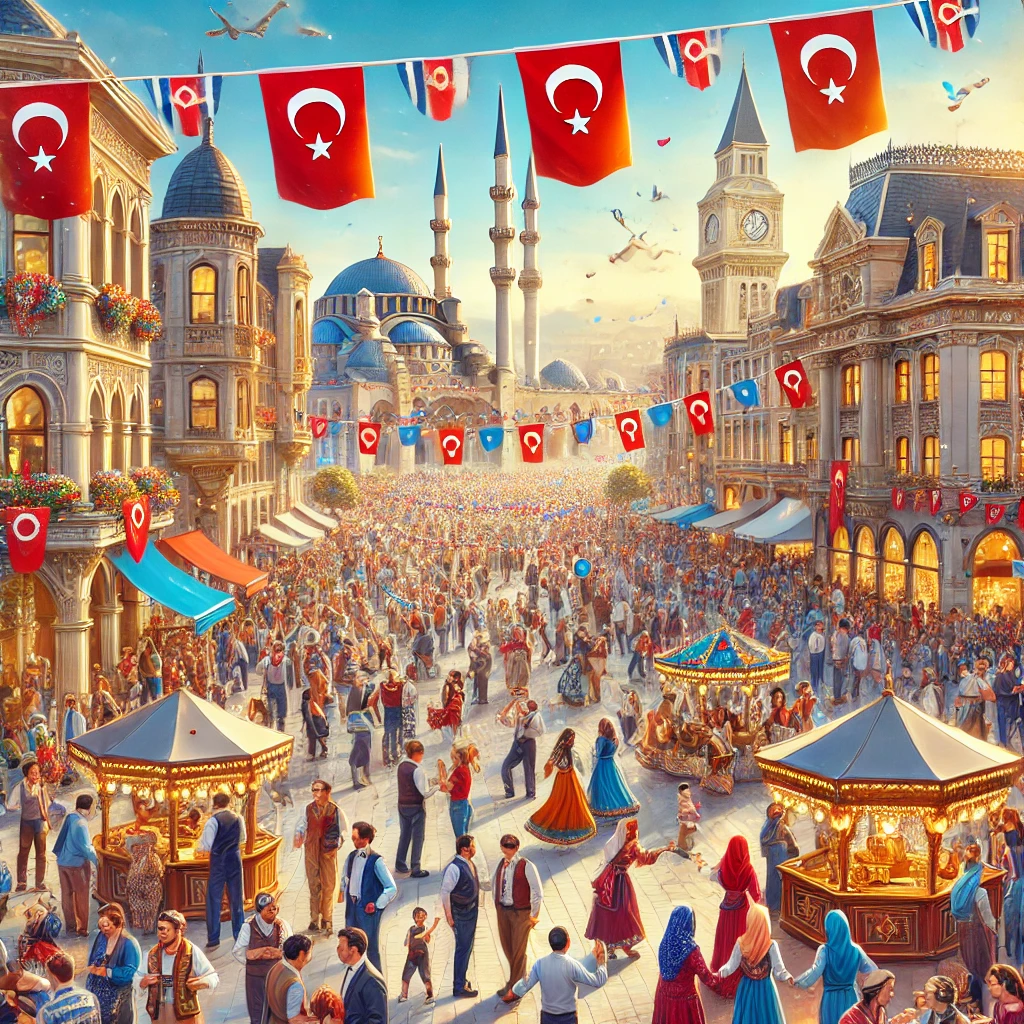Holidays in Turkey: A Comprehensive Guide for the Savvy Traveler
Turkey, with its rich history and diverse culture, is a fascinating destination for travelers. However, when planning a trip, it’s essential to be aware of the various holidays that can affect travel plans, accommodation availability, and traffic conditions. This comprehensive guide will cover cultural holidays in Turkey, national holidays, religious holidays, and other significant days to help you navigate your visit seamlessly.
Cultural Holidays in Turkey
Turkey’s cultural holidays offer a glimpse into its rich traditions and heritage. These holidays often include festivals, parades, and public celebrations that can provide a unique experience for visitors. Understanding these holidays can enhance your travel experience and allow you to participate in local customs.
One of the most prominent cultural holidays in Turkey is Nevroz, celebrated around the Spring Equinox on March 21st. Nevroz marks the start of spring and is particularly significant among the Kurdish population. The holiday involves traditional dances, music, and various public events. Participating in Nevroz festivities can provide an enriching cultural experience.
Another notable cultural holiday is Hidirelez, celebrated on May 5th, which marks the arrival of spring. People across Turkey celebrate this day with outdoor activities, including picnics, dances, and bonfires. It’s a day when people make wishes for health, prosperity, and happiness. As a traveler, joining in the Hidirelez celebrations can be a memorable way to connect with Turkish culture.
National Holidays
Turkey has several national holidays that commemorate significant events in its history. These holidays are often marked by official ceremonies, parades, and public gatherings. Being aware of these dates can help you plan your trip to avoid travel disruptions and crowded venues.
New Year’s Day (Yılbaşı) – January 1
New Year’s Day in Turkey is celebrated with decorations, fireworks, and festivities similar to Christmas in other countries. Major cities like Istanbul, Ankara, and Izmir are adorned with lights and decorations throughout December. On New Year’s Eve, many people enjoy parties and gatherings, making it a vibrant time to visit. However, it is essential to note that businesses and banks are closed on New Year’s Day, and public transportation can be crowded.
National Sovereignty and Children’s Day (Ulusal Egemenlik ve Çocuk Bayramı) – April 23
National Sovereignty and Children’s Day celebrates the establishment of the Turkish Grand National Assembly in 1920. The day is dedicated to children, with various events and activities organized nationwide. Schools participate in parades and performances, making it a festive occasion. For travelers, it is an excellent opportunity to witness local traditions and the importance of children in Turkish society.
Labour and Solidarity Day (Emek ve Dayanışma Günü) – May 1
Labour and Solidarity Day is a public holiday that recognizes the contributions of workers. While it is a day of celebration for many, it can also involve protests and demonstrations, particularly in major cities. Travelers should be cautious and avoid large gatherings to ensure safety. The holiday was reinstated as a national holiday in 2009 after being banned for several decades.
Atatürk Commemoration and Youth & Sports Holiday (Atatürk’ü Anma Gençlik ve Spor Bayramı) – May 19
Atatürk Commemoration and Youth & Sports Holiday marks the arrival of Mustafa Kemal Atatürk in Samsun in 1919, which ignited the Turkish War of Independence. The day is celebrated with sports events, parades, and ceremonies, particularly focusing on the youth. It is a significant day to observe the patriotic spirit and respect for Atatürk in Turkey.
Democracy and National Unity Day (15 Temmuz Demokrasi ve Millî Birlik Günü) – July 15
Democracy and National Unity Day commemorates the failure of the 2016 coup attempt. It is a day of remembrance and celebration of democracy and the will of the people. Although it is a relatively new holiday, businesses and official places are closed. Travelers should be aware of potential events and ceremonies that could affect travel plans.
Victory Day (Zafer Bayramı) – August 30
Victory Day celebrates the Turkish victory in the Battle of Dumlupınar, which was a crucial battle in the Turkish War of Independence. The day is marked by military parades, ceremonies, and public celebrations. It is an excellent opportunity for travelers to witness displays of national pride and the importance of the military in Turkish history.
Republic Day (Cumhuriyet Bayramı) – October 29
Republic Day commemorates the proclamation of the Republic of Turkey in 1923. The day is celebrated with parades, fireworks, and public gatherings. In many tourist areas, Republic Day marks the end of the tourist season, and travelers can enjoy significant celebrations in town squares.
Religious Holidays
Religious holidays in Turkey, primarily based on the Islamic calendar, are significant events that can impact travel plans. These holidays involve extensive celebrations, family gatherings, and, in some cases, closures of businesses and public services.
Ramadan (Ramazan)
Ramadan, known as Ramazan in Turkey, is a month-long period of fasting, prayer, and reflection for Muslims. During this time, practicing Muslims refrain from eating and drinking from sunrise to sunset. While businesses and public services remain open, it is considered respectful to avoid eating or drinking in public, especially in more conservative areas. The end of Ramadan is marked by Eid ul-Fitr (Ramazan Bayramı), a three-day celebration involving feasts, family gatherings, and charity. During Ramazan Bayramı, banks, offices, and many businesses close, and travel can be particularly busy.
Eid ul-Adha (Kurban Bayramı)
Eid ul-Adha, known as Kurban Bayramı in Turkish, is the most significant Islamic holiday. It commemorates the willingness of Ibrahim (Abraham) to sacrifice his son in obedience to God. The holiday involves the ritual sacrifice of animals, with the meat distributed to the poor. Kurban Bayramı lasts for several days, during which many businesses and public services close. Travel during this period can be challenging due to increased domestic and international travel, as well as local celebrations.
Other Significant Days
In addition to national and religious holidays, Turkey observes several other significant days that can affect travel and commerce. These days often reflect cultural traditions or commemorate historical events.
Valentine’s Day – February 14
Valentine’s Day is celebrated with romantic decorations, busy restaurants, and sales. While not a public holiday, it can impact dining reservations and the availability of services in major cities.
Gallipoli Victory Day – March 18
Gallipoli Victory Day commemorates the Ottoman Empire’s defensive victory in 1915 during World War I. The day is marked by ceremonies and rallies, particularly in the Çanakkale region. It can be a meaningful day to visit historical sites and observe national pride.
Nevroz – March 21
Nevroz, celebrated around the Spring Equinox, marks the arrival of spring and is particularly significant among Kurdish communities. The holiday involves traditional dances, music, and public events. It is an excellent opportunity for travelers to experience cultural festivities.
Mother’s Day and Father’s Day
Mother’s Day (second Sunday of May) and Father’s Day (third Sunday of June) are celebrated with sales and special events. While not public holidays, these days can impact commerce and dining reservations.
Traveling During Turkish Holidays
The savvy traveler should remember that when traveling into, in, or around Turkey, several holidays can cause delays in travel, traffic congestion, booked-up accommodation, and crowded venues. Banks, offices, and businesses are closed during official holidays, and traffic intensifies during all of the following holidays, so do your research before you visit. Do not be put off by these holidays; it is not that difficult and often quite interesting to travel during Turkish holidays. Simply plan ahead as much as possible.
Planning ahead is crucial when traveling during Turkish holidays. Booking accommodation and transportation well in advance can help avoid potential issues. Additionally, being aware of local customs and participating in holiday celebrations can enhance your travel experience.
During major holidays, many cities provide free public transportation. However, this does not include privately owned minibusses, dolmuşes, taxis, or inter-city buses. Always check whether other passengers use a ticket or token to ensure you are aware of the transport policies.
In conclusion, understanding the various holidays in Turkey is essential for planning a smooth and enjoyable trip. Whether you are interested in experiencing cultural festivities, participating in national celebrations, or observing religious traditions, Turkey offers a rich and diverse array of holidays that can enrich your travel experience. By planning ahead and respecting local customs, you can navigate these holidays and make the most of your visit to this fascinating country.
Latest Update: Jul 19, 2024
Your Content Goes Here
A brief summary of the key points in this article.




